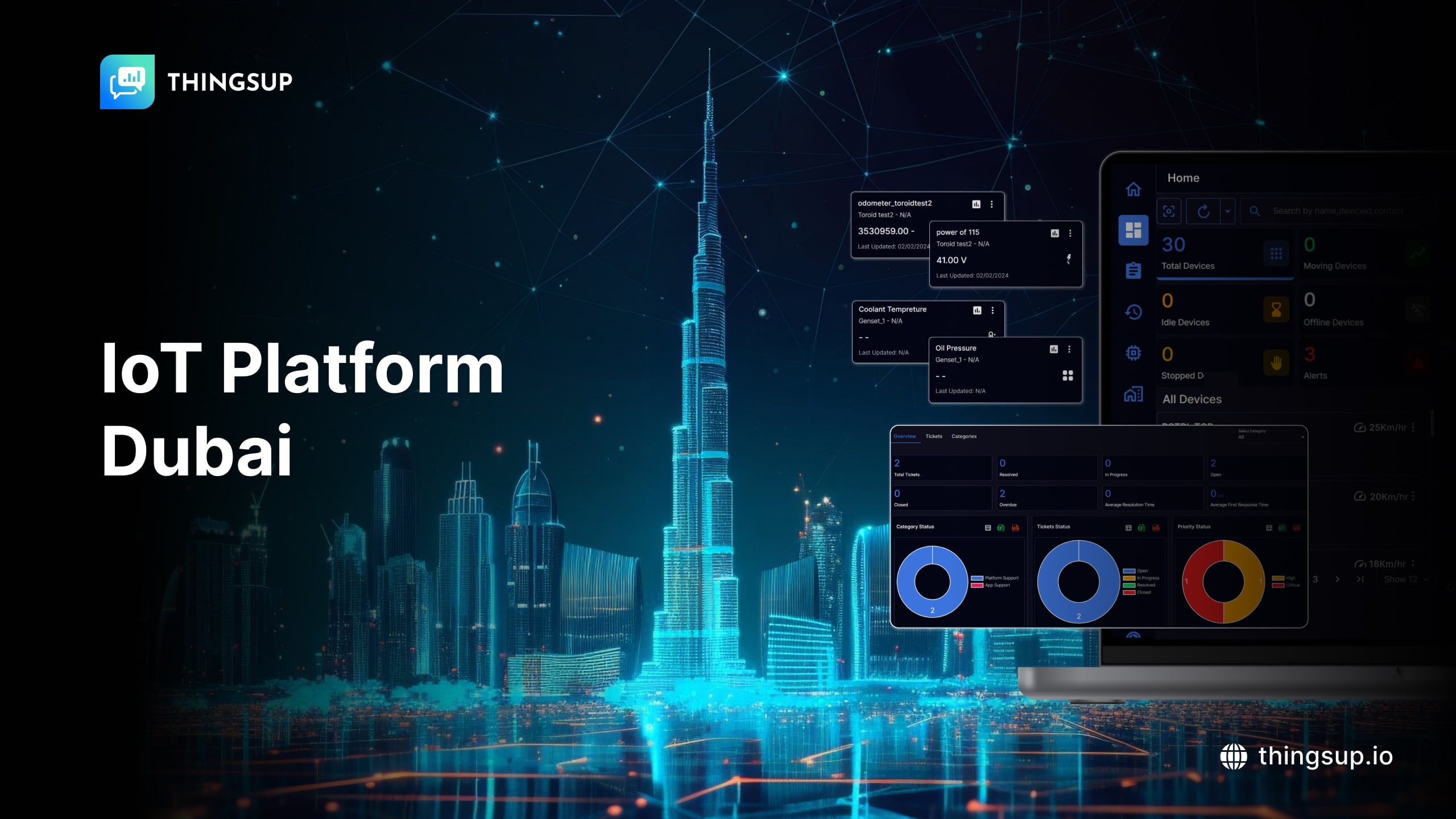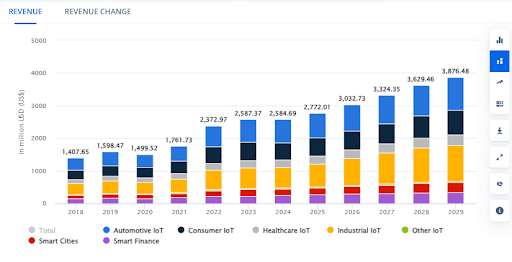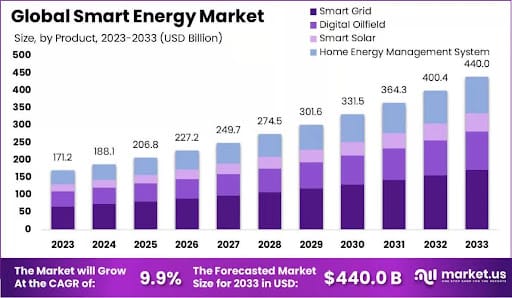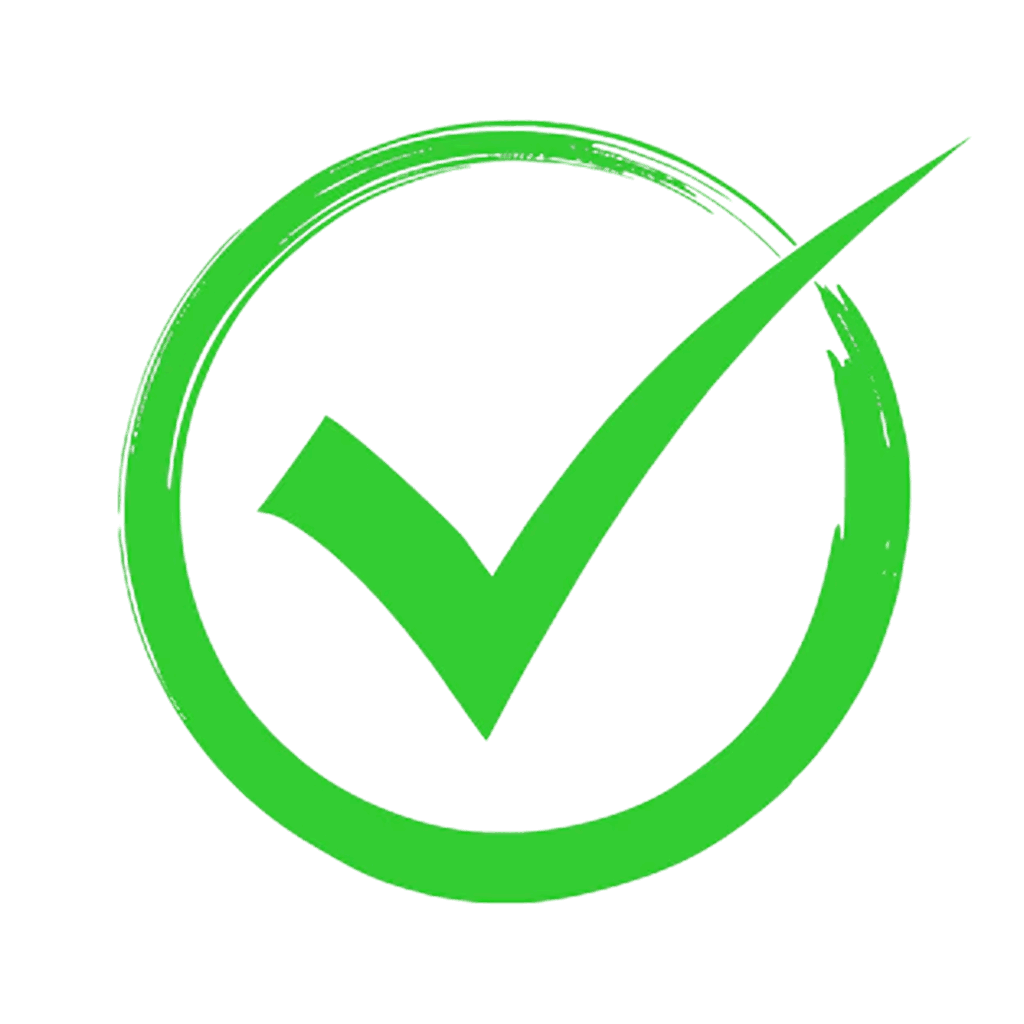Dubai has always been among the global leaders in innovation and technology. Now, Dubai has started its journey with full ambition regarding its vision of being a smart city. Ranked as one of the top ten smartest cities in the world by the Smart Cities Index, Dubai aims to leverage cutting-edge technologies to improve the lives of over 3.5 million residents.
This involves the Internet of Things, an ecosystem of several devices, sensors, and even analytics feeding into real-time decision-making while driving sustainable development.
According to a report by Statista, by 2029, the revenue in this market is projected to reach US$3,876.48m.
The Dubai Future Foundation said that by 2025, the city will have more than 1,000 fully automated government services, with IoT platforms playing a critical role in helping the city achieve this goal. Besides, Smart Dubai initiatives are set to save AED 5.5 billion annually through efficiencies powered by IoT and AI technologies.
IoT platforms have already led to great strides in the transportation, energy, healthcare, and public safety sectors. In Dubai, smart grids are adopted by the Dubai Electricity and Water Authority (DEWA), while the Roads and Transport Authority (RTA) uses IoT for autonomous mobility. This has made Dubai the world leader in smart city solutions. This blog explains how the IoT platforms allow Dubai to transform into a smart city and emerge as a model for cities worldwide.
Key Areas Where IoT Platforms are Making an Impact
IoT platforms are transforming the Dubai urban landscape across several sectors. The following represent some key areas where these platforms create a great impact.
Smart Mobility
The Roads and Transport Authority in Dubai is leading in for utilizing IoT platforms to build intelligent and efficient transportation networks. In real-time, connected sensors embedded in roads, vehicles, and traffic signals give data to IoT systems that enhance the flow of traffic and ease congestion in cities.
Traffic Management: IoT-enabled systems are used to analyze traffic flow. They forecast alternative routes and reduce commute time. Adaptive Smarter Traffic Lights – Smart traffic lights automatically change the timers based on vehicle densities, thus ensuring smooth traffic flow.
Public Transportation: IoT makes real-time tracking and scheduling possible in all metro systems, buses, and taxis. Therefore, commuters receive appropriate updates.
Autonomous Vehicles: Through IoT platforms enabling vehicle-to-vehicle (V2V) and vehicle-to-infrastructure (V2I) communication, Dubai aims for 25 percent of all travel to be driverless by 2030. Thus, autonomous cars work safer and more efficiently than traditional driving models.
Impact: Statista states that with such investments as those made by Dubai, the Internet of Things market for transportation is supposed to grow exponentially.
Smart Energy Management
A report by Market.us indicates that the global smart energy market is slowly growing. This market is likely to reach about USD 440.0 Billion in 2033 from about USD 171.2 Billion in 2023.
Dubai Electricity and Water Authority (DEWA), for its part, has been switching to IoT platforms for energy management and consumption transformation.
Smart Grids: IoT-enabled grids collect information on sources of energy, distribution networks, and end-users for better balancing of supply with demand. This is done by bringing renewables like solar power into grids for a sustainable mix of energy.
IoT Meters: Smart meters at homes and workplaces allow the consumer to use energy instantly. The consumption data being tracked enables the consumer to take action and save through behavioral change; for example, sending notification messages to make changes in their usage during peak hours saves so much energy.
Predictive Maintenance: The use of IoT sensors in real-time monitoring tracks equipment operations and detects the problems before an issue escalates. This is not only more time-saving but also reduces maintenance expenditure on energy structures.
Impact: It is said that smart grids reduce energy wastage by up to 20%. Dubai will, therefore, meet its sustainability targets. According to MarketsandMarkets report, the smart grid market is projected to grow from an estimated USD 161.1 billion by 2029 to an estimated USD 73.8 billion in 2024, at a CAGR of 16.9%.
Smart Building Management
IoT platforms are embraced in Dubai skyscrapers and commercial spaces to make their operations efficient and sustainable.
Energy Optimization: IoT sensors scan the energy consumption of buildings, adjusting lighting, heating, and cooling according to occupancy and environmental conditions. This results in reduced energy usage and associated costs.
Predictive Maintenance: IoT devices monitoring building systems such as elevators, HVAC, and plumbing find issues beforehand so that they would not be catastrophic and could avoid costly breakdowns, thus enabling smooth operations.
Health and Comfort: The IoT platforms take care of indoor air quality monitoring of carbon dioxide, temperature, and humidity for healthy environments within buildings for their occupants.
Impact: According to reports by McKinsey, IoT predictive maintenance could save maintenance costs up to 30%. On the other hand, optimal usage of energy may save 10-20%.
Healthcare and Public Safety
Consequently, IoT platforms have changed the health and public safety sectors in Dubai, thus making the city more responsive and resilient,
Smart Hospitals: The IoT platforms allow hospitals to streamline their work by managing inventories, tracking medical equipment and optimising workflow for the staff. In emergency situations, resource allocation is effective with real-time data.
Public Safety: IoT-enabled surveillance systems analyze real-time data from cameras and sensors to detect suspicious activities. This ensures prompt responses to potential threats. Automated alerts improve coordination between law enforcement agencies.
Remote Patient Monitoring: Patients’ health care could be monitored in real time through IoT-enabled devices by doctors, hence fewer hospital visits and improved care of chronic conditions. Through wearable devices, alerts regarding abnormalities would come out, and accordingly, interventions would be on time.
Impact: By 2030, the healthcare sector of Dubai is going to grow with a CAGR of 7% using IoT platforms in the delivery of advanced medical care and ensuring public safety.
Environmental Monitoring
Dubai also shows its concern for sustainability by using IoT platforms for environmental monitoring.
Air Quality Monitoring: The IoT sensors measure the level of air pollution in real-time, which is helpful for policymakers in taking actionable data. The emissions reduction efforts are guided by the insights from the sensors.
Water Management: The smart IoT devices detect leaks in the water distribution systems, which ensures efficient usage and prevents wastage. Advanced systems also monitor the quality of water to meet health and safety standards.
Waste Management: The IoT platform monitors waste collection schedules by measuring the bin’s capacity and route optimization for garbage trucks. This will also minimize the fuel consumed.
Impact: The initiatives of the IoT-driven environment have helped reduce CO2 emissions by 12% in Dubai. They further support the Green Economy Strategy by the UAE, which makes Dubai the world’s leader in terms of sustainable urban development.
The Impact of IoT on Dubai’s Economy
IoT platforms are driving smart city applications, but, above all, they contribute a significant part to Dubai’s economy. According to a report by PwC, initiatives based on IoT are likely to add $5 billion to the GDP of Dubai by 2030. These are to be driven by efficiency, cost savings, and the new industries developed by new technologies.
Job Creation: This created more than 50,000 jobs in the space of IoT in areas like data analytics to hardware and software engineers from 2015. It encourages local talent and aids in increasing international talent in the technological ecosystem.
Start-up Ecosystem: Dubai is highly focused on IoT innovation, which has helped further develop the city’s start-up ecosystem. Having Dubai Internet City, Dubai Future Accelerators, and many other such programs offered start-ups the necessary requirements, mentorship, and tools to design IoT platforms. This has attracted huge investments by global venture capital firms in Dubai.
Increased Operational Efficiency: Dubai business, from logistics to retail, employs IoT platforms. For example, supply chain firms use IoT enabled sensors to follow shipments in real-time, with the result that there is an avoidance of any delay and lesser operational costs, which in turn increases economic outputs and competitiveness in the global market for Dubai.
Smart Infrastructure Investment: The government and private enterprise collaboration to set up IoT-enabled infrastructure drives further economic growth in the city. These collaborations eventually lead to creative solutions, including IoT-based power grids and automated transportation systems that further strengthen the global position of Dubai as a tech hub.
Challenges and Solutions
While transformative, there are challenges to IoT platforms. Here are the details of the challenges and how Dubai addresses them:
Data Security and Privacy
The sheer volume of data generated by devices through IoT is, therefore, a significant source of risk in terms of security and privacy. Consequently, hackers can look for loopholes here, to gain access and commit data breaches.
Solution: Dubai uses multi-layered security approaches:
Advanced Encryption Standards: IoT devices and platforms encrypt the exchange data to prevent unauthorized interception.
Blockchain Technology: Dubai uses blockchain technology to make its data secure and, simultaneously, transparent. This eliminates risks because it is decentralized with no single points of failure.
Regulatory Frameworks: The government of Dubai operates on tight data protection regulations that keep citizen data secure.
Interoperability Issues
Integrating a diverse set of devices and systems is one of the major challenges. If the manufacturers don’t support interoperability, then products from different producers might not interact resulting in reduced productivity.
Solution:
Open Standards Adoption: Dubai adopts open standards and protocols, so devices and platforms can connect without interruptions.
IoT Unified Platforms: Centralized IoT platforms help achieve interoperability since they act as a bridge between heterogeneous systems, ensuring smooth communication.
Infrastructure Readiness
Developing and sustaining IoT-ready infrastructure requires significant investment and technological know-how. Inadequate infrastructure will also delay the rollout of IoT.
Solution:
Public-Private Partnerships: Dubai partners with private companies to co-develop IoT infrastructure, thereby splitting costs and expertise.
Incremental Deployment: The city follows a phased approach, focusing on high-impact areas such as transportation and energy grids, and then expanding to other sectors.
Scalability Challenges
With an exponentially growing number of connected devices, it becomes very difficult to scale up IoT platforms concerning growing loads of data and devices.
Solution:
Cloud-Based Architectures: The IoT platforms of Dubai utilize cloud technology to offer flexibility in scaling up match growing demands.
Edge Computing: The processing proximity reduces latency. Hence, the scalability of the IoT systems is enhanced.
Skill Gaps and Workforce Training
The rapid evolution of IoT technology leaves a considerable gap in terms of skills possessed by the available workforce to create and manage an IoT platform effectively.
Solution:
Educational Investments: Dubai focuses on special upskilling courses and certification schemes to equip the workforce with relevant IoT technology capabilities.
Talent Acquisition: It attracts skilled personnel from across the globe due to its tech vibrant ecosystem and other competitive incentive offerings.
Conclusion
The IoT platforms deployed in Dubai depict its stand for innovation and sustainability. Its transport, governance, environment, and many more areas have evolved with the inception of IoT technology and stand as an example for every smart city globally. With growing capabilities in the IoT platform, the city’s vision to become the smartest in the world is slowly becoming reality.
Those seeking IoT platform solutions in Dubai do not have fewer options. From a reformed urban mobility system to a public services upgrade or even to promote a sustainable lifestyle, everything has been central to the transformation of IoT platforms in Dubai.







